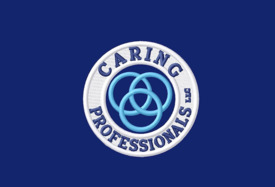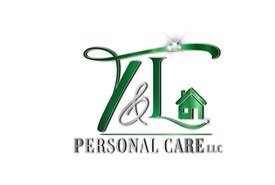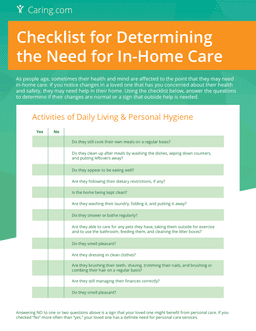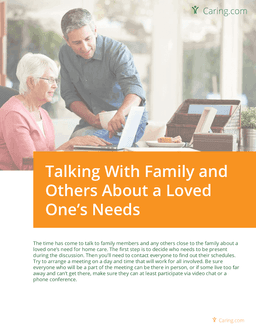
629 North New Ballas Rd, Creve Coeur, MO, 63141
Pricing not available
Caring.com offers a free service to help families find senior care and authentic reviews to help you in...

629 North New Ballas Rd, Creve Coeur, MO, 63141
Pricing not available

12882 Manchester Road , Ste 201 , St. Louis, MO, 63131
Pricing not available

4969 Ashby Ave, St. Louis, MO, 63115
Pricing not available

1525 Stallion Drive , Florissant, MO, 63033
Pricing not available

744 Spirit of Saint Louis Blvd Suite I , Chesterfield, MO, 63005
Pricing not available

320 Brookes Dr , Saint Louis, MO, 63042
5.0
(1 reviews)
I am currently using LRB Home Health Care. They're good, punctual, and courteous. They come in and clean up for me. They're very professional. They take care of my needs....
Pricing not available
Caring's Family Advisors are here to help you with questions about senior living and care options.

219 North Port Hill Dr , Florissant, MO, 63033
Pricing not available
According to Genworth’s 2020 Cost of Care Survey, seniors in St. Louis pay an average of $4,481 per month for in-home care. This rate matches the U.S. average but is slightly higher than Missouri’s statewide average of $4,372 per month. Other cities across Missouri generally have less expensive home care costs with the exception of Kansas City and Columbia, which are tied at $4,576 per month. Home care in Jefferson City, located 130 miles west of St. Louis, costs $4,052 per month. Cape Girardeau, less than 120 miles south of St. Louis, has the most affordable home care services in the Show-Me State with a monthly average of just $3,318.
St. Louis
$4,481
Missouri
$4,372
United States
$4,481
Cape Girardeau
$3,318
Columbia
$4,576
Jefferson City
$4,052
Kansas City
$4,576
Although home health care includes skilled clinical services, it costs the same as basic home care in St. Louis, averaging $4,481 per month. Adult day health, which provides weekday care for seniors, costs just $1,842 per month. Assisted living facilities in St. Louis average $3,750 per month, while nursing homes generally require a monthly fee of $5,355.
Home Care
$4,481
Home Health Care
$4,481
Adult Day Health
$1,842
Assisted Living
$3,750
Nursing Home Care (semi-private room)
$5,355
Given the high cost of in-home care, many people use one or more forms of financial assistance to cover the expenses. Below, we explain some of the most common sources of financial help for paying for in-home care. If none of these options are available to you, you can reach out to your Area Agency on Aging or Aging and Disability Resource Center to learn about local resources.
Long-Term Care Insurance: Long-Term Care Insurance covers expenses related to senior care, including in-home care. Depending on the policy type, beneficiaries may receive a cash payment to use towards long-term care or reimbursement for qualifying long-term care expenses. Note that there are limitations- typically a maximum benefit of $150 per day- and exact coverage terms vary depending on the exact policy, so always check the details.
Medicare: Medicare does not cover in-home care because it is classified as custodial, or non-medical, care. However, some Medicare Advantage and Medicare Supplement plans, which offer expanded benefits, may cover in-home custodial care.
Medicaid: Medicaid coverage of in-home care varies between different states because it is not a federally mandated benefit. Currently, all states cover some in-home care either through their standard Medicaid or a waiver program. The specific coverage rules are set individually by each state.
Veterans’ Benefits: The Aid and Attendance benefit is a monthly cash payment that beneficiaries can use to pay for senior care, including in-home care services. To qualify for A&A, Veterans must already receive the VA pension and meet several additional requirements, including needing assistance with the activities of daily living.Contact the Department of Veterans Affairs to learn more.
Reverse Mortgages: Home Equity Conversion Mortgages (HECMs) are federally insured loans that are available to homeowners age 62 and over. Reverse mortgages allow you to access a portion of your home’s equity in cash, tax free. Many seniors use reverse mortgages to finance their care expenses, including in-home care. Note that although there are no monthly payments due on reverse mortgage loans, borrowers do have to repay the loan once the last surviving homeowner passes away, moves, or sells the home.
The second-largest city in Missouri, St. Louis is home to many resources that help seniors age in place. Federally funded programs help seniors save money by weatherizing their homes and paying for utility bills. Nonprofit organizations also offer assistance by providing minor home repairs. Seniors can learn more about these programs by reaching out to the agencies below.
| Resource | Contact | Service |
|---|---|---|
| Urban League Weatherization Assistance Program | (314) 615-3646 | Provided by the Urban League of Metropolitan St Louis, a 501(c)(3) nonprofit organization, the Urban League Weatherization Assistance Program lowers seniors' utility bills and improves the comfort and safety of their homes by having professional handymen make repairs and installations that boost energy efficiency. Under the Weatherization Assistance Program, qualified volunteers may caulk air leaks, install insulation, replace doors and replace furnaces. |
| Saint Louis Minor Home Repair Program | (314) 771-5000 | Funded through a combination of federal and local grants, the Saint Louis Minor Home Repair Program promotes in-home safety and boosts seniors' quality of life by offering nonemergency, minor home repairs to local senior citizens aged 62 and up who own and live in their own home. The organization dispatches trained volunteer handymen to fix electrical, plumbing and HVAC deficiencies. The program can also install security-boosting features, including exterior lights and deadbolt locks, and complete accessibility modifications, such as installing handrails and grab bars. |
| Low Income Home Energy Assistance Program | (314) 615-3632 | The Low Income Home Energy Assistance Program is a federal program that helps St. Louis seniors afford utility bills to prevent safety and health hazards caused by insufficient heating and cooling. LIHEAP consists of two subprograms: Energy Assistance, which provides a one-time payment for heating or cooling costs, and the Energy Crisis Intervention Program, which helps seniors through sudden, unexpected resource problems by paying as much as $1,600 toward outstanding utility bills. |
| County Older Resident Program | (314) 615-4516 | St. Louis County offers a lineup of essential services to older adults aged 60 and up who reside in St. Louis County. Allowing three to four days of lead time for scheduling, seniors can arrange rides to local medical appointments and other high-priority destinations thanks to local volunteers. The county arranges volunteers to call homebound seniors by phone to check on their well-being and combat loneliness. Other services provided include senior-oriented presentations, local resource referrals, insurance claims assistance and help filing income tax returns. |
Aging can be a difficult process, and loved ones may not always ask for help – oftentimes it’s up to their family to evaluate their need for help around the house. While no two situations are exactly alike, this checklist can help you and your loved ones determine when it’s time to start the search for a home care provider.


If you’ve determined that your loved one needs the assistance of a care provider in their home, it may be time for a difficult conversation. Handled correctly, however, this process can bring a family together and ensure that everyone’s concerns are addressed. Use this PDF as a starting point to help the conversation stay as positive and productive as possible.


Home Care
Anonymous_7648
5.0
Review of BrightStar Care Central St. Louis County
The caregivers have always been very polite. They ask me if I need to got to the doctor or out shopping. They are very good at what they do. The young lady that comes, is very polite and no...
Home Care
Beth B_23
4.0
Review of BrightStar Care Central St. Louis County
The agency can be more aware of my care needs. The services were not what I thought they would be. The services were not as needed as I thought I would.
Home Care
Paul Z_4
5.0
Review of BrightStar Care Central St. Louis County
It has helped me cope post hospitalization. They have been efficient and are nice.